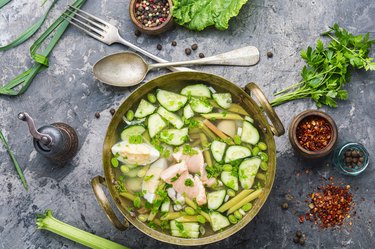
A lichen sclerosus diet is a sought after subject for those with the chronic condition, hoping eating or avoiding certain foods may help alleviate symptoms. The condition is not well understood, but it is speculated by the National Institutes of Health to be a result of autoimmune issues.
Lichen sclerosus is a chronic skin condition with uncomfortable symptoms of itchiness, pain and blistering, according to the University of Michigan Center for Vulvar Diseases. The majority of those with the disorder are women over the age of 50, but it can affect men, women and children. Typically, the skin affected is the skin around the external area of the vagina (vulva) and around the anus. In men, it is usually at the tip of the penis.
Video of the Day
Video of the Day
The disorder does not get better on its own and requires medical intervention such as corticosteroids, other creams or surgery.
Foods to Avoid
The link between lichen sclerosus and diet is not well understood and studies remain inconclusive. The Vulval Pain Society notes that limited research points to foods high in oxalates as being detrimental to those with lichen sclerosus.
High levels of oxalates in the urine may cause vulvar burning and irritate the skin. The evidence is inconclusive, but it may be a good idea to try a low-oxalate diet to see if this helps improve symptoms.
As described in the April 2018 issue of the Journal of Food Research, foods particularly high in oxalates may be foods to avoid with lichen sclerosus. Some examples are:
- Almonds
- Bagels
- Baked potato
- Beets
- Bran flakes with raisins
- Buckwheat groats
- Bulgur
- Cashews
- Chocolate
- Corn grits
- French fries
- Lentil soup
- Navy beans
- Miso soup
- Okra
- Raspberries
- Rhubarb
- Spinach
- Soybeans
Avoiding these foods could potentially help curb the symptoms of lichen sclerosus.
Foods to Eat
According to Winchester Hospital, foods and drinks low in oxalates include:
- Most fruits, including apples, avocado, banana, sweet cherries, citrus, melons, peaches and pears
- Most vegetables, including artichokes, asparagus, broccoli, Brussels sprouts, cabbage, cauliflower, corn, cucumbers, lettuce, mushrooms, peas, peppers and zucchini
- Coffee
- Cooked and dry cereals without bran or nuts
- Eggs and egg noodles
- Desserts without chocolate or nuts
- Fish
- Meat
- Poultry
- Rye bread
- White or wild rice
Calcium binds to oxalates, per the Cleveland Clinic, so eating calcium-rich foods may help reduce the amount of oxalates absorbed by your body.
Foods high in calcium include:
- Broccoli rabe
- Canned salmon
- Canned shrimp
- Collard greens
- Nonfat yogurt
- Orange juice
- Parmesan cheese
- Ricotta cheese
- Sardines
- Tofu
Lichen Sclerosus Diet Tips
Beyond being careful about the amount of oxalates you're eating, the following diet tips may help manage symptoms of lichen sclerosus.
1. Consider Adopting an Autoimmune Protocol Diet
Although there are no direct recommendations for a lichen sclerosus diet, there is a strong link to autoimmune disorders, hormone imbalances and autoantibodies, so a diet used to control autoimmune disorders could potentially help with symptoms.
The November 2017 issue of Inflammatory Bowel Diseases describes the autoimmune protocol diet as consisting of a six-week elimination phase during which grains, legumes, nightshades, dairy, eggs, coffee, alcohol, nuts and seeds, refined/processed sugars, oils and food additives are removed from the diet.
This diet is maintained for several weeks and sometimes foods are slowly reintroduced to observe if symptoms return. This can help target offending foods. In other cases, people with autoimmune diseases may choose to keep these foods out of the diet indefinitely.
This type of elimination diet can be tricky to do on your own, so it's a good idea to enlist the help of your doctor or a dietitian, to make sure you're still getting the nutrients you need.
2. Add a Calcium Citrate Supplement
As we noted above, calcium binds to oxalates in your body. If you don't get enough high-calcium foods in your diet, you may want to take a calcium supplement. Calcium citrate is the preferred form, according to the Cleveland Clinic.
3. Drink Plenty of Water
Make sure to drink plenty of H2O throughout the day, which will help you stay hydrated but also thin out your urine, which can prevent the buildup of chemicals that can irritate lichen sclerosus. The Cleveland Clinic recommends drinking 10 to 12 cups of fluid daily, with at least five of those cups being water.
- National Institutes on Health: "Lichen sclerosus"
- Journal of Food Research: "Oxalates are Found in Many Different European and Asian Foods - Effects of Cooking and Processing"
- University of Michigan Center for Vulvar Diseases: "Vulvar Conditions & Management: An Educational Booklet for Patients"
- Inflammatory Bowel Diseases: "Efficacy of the Autoimmune Protocol Diet for Inflammatory Bowel Disease"
- Vulval Pain Society: "Published Research"
- Winchester Hospital: "Low-Oxalate Diet"
- Cleveland Clinic: "Kidney Stones: Oxalate-Controlled Diet"
Is this an emergency? If you are experiencing serious medical symptoms, please see the National Library of Medicine’s list of signs you need emergency medical attention or call 911.